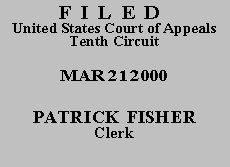 UNITED STATES COURT OF APPEALS
UNITED STATES COURT OF APPEALS
 UNITED STATES COURT OF APPEALS
UNITED STATES COURT OF APPEALS
TENTH CIRCUIT
| DON RAY JONES, | |
| v. | No. 99-5193 |
| SAM CALBONE, Warden, Great Plains Correctional Facility | (D.C. No. 98-CV-760-B)
(N.D. Okla.) |
ORDER AND JUDGMENT(*)
Before BALDOCK, HENRY, and LUCERO, Circuit Judges.(**)
Petitioner Don Ray Jones, proceeding pro se, appeals the district court's denial of his petition for a writ of habeas corpus under 28 U.S.C. § 2254. The district court denied Petitioner's motion to proceed in forma pauperis on appeal, see 28 U.S.C. § 1915(a)(1), and his application for a certificate of appealability, see 28 U.S.C. § 2253(c)(2). We deny Petitioner's application for a certificate of appealability and dismiss Petitioner's appeal.
In 1987, Petitioner pled nolo contendere to first degree murder in Craig County, Oklahoma, District Court and received a life sentence. In 1996, Petitioner filed a petition for a writ of habeas corpus in state court, which was denied. The Oklahoma Court of Criminal Appeals affirmed. Jones v. Medick, No. H96-664 (Okla. Ct. Crim. App. July 3, 1996) (unpublished). Petitioner again sought state post-conviction relief in 1997. His request was again denied, and the Court of Criminal Appeals again affirmed. Jones v. State, No. PC97-999 (Okla. Ct. Crim. App. Sept. 5, 1997) (unpublished).
Petitioner next filed a petition for a writ of habeas corpus in federal district court on September 14, 1998. The district court dismissed the petition, concluding that Petitioner had filed it outside the one-year grace period and that the grace period was not tolled during the pendency of his state post-conviction proceedings. See 28 U.S.C. § 2244(d); Hoggro v. Boone, 150 F.3d 1223 (10th Cir. 1998) (applying 28 U.S.C. § 2244(d)(2) to toll the grace period during the pendency of properly-filed applications for state post-conviction relief).
Assuming the grace period were tolled during the pendency of Petitioner's state proceedings for post-conviction relief, the grace period still expired more than 11 months before Petitioner filed his federal petition.(1) The grace period began running on April 24, 1996, see United States v. Simmonds, 111 F.3d 737, 744-46 (10th Cir. 1997) (granting prisoners whose convictions became final before April 24, 1996, one year to file petitions pursuant to 28 U.S.C. § 2254), and ran until May 3, 1996, when Petitioner filed his state petition for habeas corpus, a 9-day period. The grace period ran again from July 3, 1996, when the Court of Criminal Appeals affirmed the denial of the petition, until April 30, 1997, when Petitioner filed his second petition for post-conviction relief in state court, a 10-month period. Finally, the grace period resumed on September 5, 1997, when the Court of Criminal Appeals affirmed the denial of the second petition, and expired on or about November 8, 1997. Therefore, the federal petition filed on September 14, 1998 was untimely. The district court correctly denied Petitioner's application for a certificate of appealability.
CERTIFICATE OF APPEALABILITY DENIED; APPEAL DISMISSED.
Entered for the Court,
Bobby R. Baldock
Circuit Judge
*. This order and judgment is not binding precedent, except under the doctrines of law of the case, res judicata, and collateral estoppel. The court generally disfavors the citation of orders and judgments; nevertheless, an order and judgment may be cited under the terms and conditions of 10th Cir. R. 36.3.
**. After examining the briefs and appellate record, the panel has determined unanimously that oral argument would not materially assist the determination of this appeal. See Fed. R. App. P. 34(a)(2)(c); 10th Cir. R. 34.1(G). The case is therefore ordered submitted without oral argument.
1. We question the district court's conclusion that state post-conviction proceedings that challenge the execution of the sentence, rather than the constitutionality of the judgment, do not toll the limitations period under 28 U.S.C. § 2244(d)(2). See Martin v. Embry, No. 99-1203, 1999 WL 1123077 at *2 (10th Cir. Dec. 8, 1999) (unpublished) (holding that a sentence reconsideration motion under Colo. R. Crim. P. 35(c) tolled the statute of limitations under 28 U.S.C. § 2244(d)(2)).